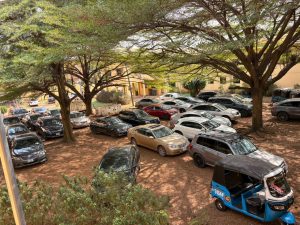World Drug Day 2023: UNODC urges to put People first, stop stigma and discrimination, strengthen prevention.
4 min read
Unodc logo
World Drug Day 2023: UNODC urges to put People first, stop stigma and discrimination, strengthen prevention.
By Admin
🌿 Ruzu Non-Alcoholic Herbal Bitters
Ruzu Non-Alcoholic Herbal Bitters is a natural health supplement specially formulated to:
- ✅ Promote general wellness
- ✅ Detoxify the body
- ✅ Support the treatment of various ailments
Made from a powerful blend of 100% organic and medicinal herbs, Ruzu is completely alcohol-free, making it ideal for:
- 👪 All age groups
- 🌱 Health-conscious individuals
- 🌿 Anyone seeking non-alcoholic herbal remedies
Whether you're looking to boost your vitality, cleanse your system, or support healing the natural way, Ruzu Bitters offers a trusted herbal solution.

Never has the World drug problem been more dire as the United Nations Office on Drugs and Crime continues to record increasing illicit drug supply and consumption, ever more agile and globally interconnected trafficking networks, ill-equipped health services, overstretched law enforcement and unprepared communities and families.
UNODC’s 2023 World Drug Report estimates that more than 13 million people are injecting drugs, 18 per cent higher than previously estimated. Globally, close to 300 million people use drugs, an increase of 23 per cent over the previous decade. The number of people who suffer from drug use disorders, meanwhile, has skyrocketed to close to 40 million globally, a 45 per cent increase over 10 years.
Rising drug use prevalence constitutes a serious public health crisis, also in Nigeria. When in 2018 the National Bureau of Statistics and the United Nations Office on Drugs and Crime published the first national drug use survey, the results took everyone by surprise. Drug use prevalence stood at more than 14 % almost three times higher than the global average. Data collected by UNODC of more recent among young people suggests that the situation might even have worsened, with more than 50% of Nigerian youth indicating in 2021 that they knew someone who had used drugs over the course of the past 12 months.
The World Drug Report also shines light on drug use among displaced persons – a topic of acute relevance to Nigeria. A pilot study conducted among IDPs in Northern Nigeria suggest that drug use prevalence might be up to twice as frequent among this specific group.
Moreover, this year’s World Drug Report dedicates a chapter to the environmental impact of drug production, again a topic of interest also in Nigeria. The 2022 Nigeria Cannabis Cultivation Survey conducted by UNODC found a clear relationship between cannabis cultivation and deforestation with 39% of all cannabis fields detected in 2019 having been cultivated in forest areas cleared in the same year.
However, 2022 also marked the year of considerable progress and achievements in improving the collective response of Nigeria to drug demand and supply reduction with almost daily reports by NDLEA of significant drug seizures and related arrests. Also, despite falling significantly short of actual needs, access to drug treatment and counselling has more than doubled over the past years. School based drug prevention programmes, such as UNPLUGGED, have reached more than 175,000 students across 400 Secondary schools, thanks also to the laudable support by the MTN foundation.
In 2022, UNODC in partnership with NDLEA, the Federal Ministries of Health and Education and NAFDAC successfully closed the EU sponsored project Response to Drugs and Related Organized Crime in Nigeria. With 40 million USD the project constitutes until this day the largest, longest lasting, and most significant technical cooperation project of its kind ever implemented by UNODC.
This intervention has been catalytic in helping to create data and knowledge around drug control and informed evidence-based policy making, such as the National Drug Control Master Plan. It assisted in strengthening technical law enforcement capabilities and expertise and provided NDLEA with substantial logistical support for its operations as well as its academy. It delivered tailor-made Drug Prevention, Treatment and Care Sensitization training to close to 10,000 frontline workers, including health professionals, traditional and community leaders, police officers and social workers.
Against this backdrop, UNODC identifies the following five core policy priorities: Firstly, there is a need to further enhance NDLEA’s specialized operational, technical and forensic capabilities as well as international networks to investigate, disrupt and dismantle transnational drug trafficking networks.
Secondly, there is a need to improve domestic coordination and cooperation among various specialized law enforcement agencies in order to tackle the ever more sophisticated and versatile organized crime groups often engaging in multiple criminal markets.
Thirdly, UNODC urged to scale up drug use prevention, targeting children and youth. The implementation of school-based drug prevention programmes such as UNPLUGGED needs to be rolled out to all public and private secondary schools in Nigeria and new innovative approaches need to be found to also reach the approximately 13 million out of school children, e.g. through sports based initiatives.
Read Also:Oyo Govt. Pledges to Curb Drug Abuse, Illicit Trafficking.
Fourthly, the health sector response to drug use requires a fundamental upgrade. Undoubtedly over the past decade strides have been made, allowing to double the drug treatment capabilities from 55 to 110 drug treatment and drug counselling centers. Yet, access remains a major challenge, for women and girls, with several States having no drug treatment facilities at all and hardly any having such facilities outside their respective state capitals.
Lastly, the National Bureau of Statistics should be tasked to conduct of a second Drug Use Survey. Six years have passed since the publication of the first Drug Use Survey in Nigeria. Most of the policies and assumptions are, therefore, based on dated data and might very well be off target or at the very least not as well calibrated as they should be for maximum impact.




